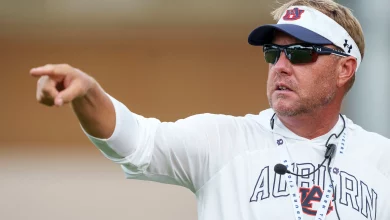Aggie Gameday Extra Podcast: Could the Nico Iamaleava situation happen at Texas A&M?

In the fast-evolving world of college football, the intersection of high-profile recruits, massive NIL deals, and the competitive pressure to win has created a perfect storm for the sport. The departure of Tennessee quarterback Nico Iamaleava after reported conflicts related to NIL deals has become a focal point for discussions about the future of college athletics. On the Aggie Gameday Extra Podcast, Texas A&M sports experts and analysts took a deep dive into whether a similar situation could unfold at their own program.
Could Texas A&M, which has aggressively entered the NIL space, find itself in a similar controversy? Could one of their star players leave due to a mismatch between expectations and reality surrounding NIL compensation? This article will explore these questions, assess the implications of the Iamaleava saga, and analyze how Texas A&M is navigating the challenges posed by NIL.
The Nico Iamaleava Saga: A Deep Dive
Nico Iamaleava was one of the most hyped quarterback recruits in the country when he signed with the University of Tennessee. As a highly sought-after player, his recruitment was heavily influenced by the rapidly growing NIL (Name, Image, and Likeness) landscape. According to reports, Iamaleava was offered an NIL deal worth over $8 million, an amount that would set him up financially for life, even before playing a snap in college football.
The expectations were high. Tennessee fans and coaches hoped that Iamaleava would be the centerpiece of their offense, leading them to national prominence. His recruitment, at the time, was seen as a game-changer for both Tennessee and the landscape of college football. However, as the season progressed and Iamaleava faced his share of struggles on the field, the situation began to sour.
According to multiple reports, Iamaleava’s relationship with the Tennessee program started to fray when there were discrepancies over the promised NIL earnings. Iamaleava allegedly became frustrated with the lack of alignment between the promises made during his recruitment and the reality of what was being delivered. This led to him entering the transfer portal in April 2025, seeking both a fresh start on the field and a more favorable NIL arrangement.
The situation was widely discussed in college football circles, raising questions about the future of NIL and its impact on college sports. Was the promise of financial rewards leading to unrealistic expectations? Could NIL deals begin to eclipse the traditional motivations of players, such as playing for the team or pursuing a championship?
Texas A&M’s Aggressive Approach to NIL
Texas A&M University has made headlines in recent years due to its aggressive approach to NIL. Under the leadership of head coach Mike Elko, the Aggies have worked to establish a strong NIL presence, with the intent of competing with other powerhouse programs. The Aggies have quickly positioned themselves as one of the schools most willing to embrace the NIL era, but with that comes potential risks — particularly when it comes to managing expectations and maintaining team cohesion.
The 2025 recruiting class, for instance, saw several high-profile players choose Texas A&M in large part due to NIL offers. However, while the financial rewards may be enticing, there is concern about whether these athletes are prioritizing money over the team’s collective success.
In particular, Texas A&M’s commitment to NIL has sparked conversations within the college football community about whether these kinds of large sums will cause internal friction. As much as these deals can attract top talent, they can also lead to potential conflicts between players, coaches, and even other university programs.
Texas A&M’s “Collective” — the fund that supports NIL deals for athletes — has played a significant role in the recruiting process. However, as the Iamaleava situation demonstrated, these arrangements are not always as stable or dependable as they initially appear. The podcast hosts raised concerns about what could happen if a high-profile player at Texas A&M were to become dissatisfied with their NIL deal, questioning whether the system is sustainable.
Coach Mike Elko’s Approach to NIL
One of the key aspects of the discussion on the Aggie Gameday Extra Podcast was Coach Mike Elko’s philosophy on NIL. Elko, who took over as head coach in 2024, has been relatively vocal about how NIL should be integrated into college football. Unlike some programs that rely heavily on massive NIL deals to recruit players, Elko has stated that he believes in keeping NIL at the periphery of recruitment, focusing more on player development and the overall culture of the team.
Elko has been steadfast in his belief that while NIL is a tool that can benefit players, it should not overshadow the core values of the program. His goal is to recruit players who genuinely want to be part of Texas A&M’s culture, who are passionate about playing for the team, and who understand the responsibility that comes with NIL compensation. Elko has also indicated that he believes in complete transparency when it comes to NIL, emphasizing that the focus should remain on what’s best for the player both on and off the field.
However, as the Iamaleava situation illustrated, navigating NIL deals isn’t always as straightforward as it seems. Elko’s position is pragmatic — understanding the value of NIL but keeping it in balance with the team-first mentality that Texas A&M has built its foundation on. The big question for Texas A&M is whether this approach will prevent conflicts like the one at Tennessee, or if the allure of massive financial deals will eventually lead to cracks in the program’s cohesion.
Could a Nico Iamaleava-Type Situation Happen at Texas A&M?
While Texas A&M’s leadership has worked to establish a framework that minimizes the potential for conflict, the reality is that NIL has fundamentally changed the dynamics of college football. Iamaleava’s situation highlights a problem that many programs will likely face at some point: reconciling the financial incentives of NIL with the long-term development goals of a college football program.
The primary concern voiced on the Aggie Gameday Extra Podcast was that, even with Elko’s guidance, the pressures of NIL could eventually cause issues for the Aggies. If a highly-recruited player were to come to Texas A&M with a significant NIL deal and then underperform on the field, it could lead to dissatisfaction both from the player and their representatives, especially if the promised financial incentives are not met. This could lead to a situation where the player transfers, much like Iamaleava did at Tennessee, in search of both playing time and a more favorable NIL arrangement.
Further complicating this is the pressure from the fans and boosters who expect results. Texas A&M’s NIL initiatives have been backed by some of the largest donors in college football, and the stakes for recruits and their representatives have never been higher. This can create a toxic environment if not managed properly, where players may start to expect more than they initially bargained for — putting financial considerations ahead of team success.
Yet, it’s important to note that Texas A&M has certain advantages that could mitigate the risk of such a situation. For one, Elko’s leadership is grounded in integrity and stability, and he has made it clear that NIL will never overshadow the fundamental goals of the program. The culture at Texas A&M, known for its emphasis on teamwork and accountability, could serve as a protective barrier against the negative aspects of the NIL era.
What Can Texas A&M Do to Protect Itself?
So, how can Texas A&M protect itself from a situation similar to what happened at Tennessee with Iamaleava? According to the podcast hosts, there are a few critical steps the program can take:
- Establish Clear NIL Guidelines: Ensuring that both players and their families have a clear understanding of what NIL is and how it works is key. Texas A&M should set transparent expectations and make sure all parties involved understand that NIL is a supplementary benefit, not the driving force behind recruitment.
- Focus on Culture Over Money: While NIL can attract top talent, focusing on developing a team-first mentality will be essential. Players should be recruited for their commitment to the program, not just the paycheck.
- Constant Communication: Open and honest communication with players and their families is essential to prevent misunderstandings and avoid the buildup of unrealistic expectations.
- Monitor the Market Closely: As the NIL landscape continues to shift, Texas A&M must stay ahead of the curve by adapting its strategies and keeping a close eye on what other programs are doing.
While the Iamaleava situation at Tennessee was eye-opening, Texas A&M seems poised to avoid similar conflicts. The leadership of Coach Mike Elko, combined with a strong focus on team culture and integrity, should provide the foundation for a more stable NIL environment. However, the world of college football is constantly evolving, and it’s important for programs like Texas A&M to remain vigilant as they navigate this new era of athlete compensation.
At the end of the day, whether or not a situation like Iamaleava’s occurs at Texas A&M may come down to how well the program balances NIL opportunities with its broader mission of player development and team success. While NIL will undoubtedly play a role in shaping the future of college football, it’s the culture, leadership, and commitment to the team that will ultimately determine whether or not players can thrive within it.
As the Aggie Gameday Extra Podcast concluded, the key to navigating the NIL era is not just about offering the best deals — it’s about creating an environment where players feel valued both on and off the field. If Texas A&M can achieve this, it may very well avoid the pitfalls that other programs have already encountered.









